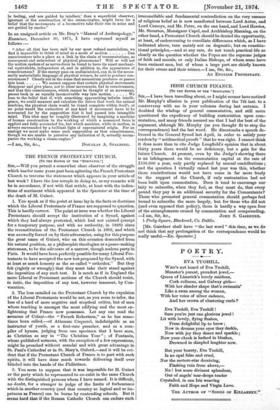THE FRENCH PROTESTANT CHURCH.
[TO TIER EDITOR OF THE "SPECTATOR:1
SIR,—Will you permit a somewhat close observer of the struggle -which has for some years past been agitating the French Protestant Church to traverse the statement which appears in your article of last week ? I have the less scruple in doing so, as my remarks will be in accordance, if not with that article, at least with the indica- tions of sentiment which appeared in the Spectator at the time of the death of M. Guizot.
1. You speak as if the point at issue lay in the facts or doctrines -which the Liberal Protestants of France are supposed to question. This is hardly correct. The point at issue was whether the Liberal Protestants should accept the institution of a Synod, against which they had always protested, which had not existed (except for a temporary purpose, and with no authority, in 1848) since the reconstitution of the Protestant Church in 1802, and which was avowedly forced on by their adversaries, using for this purpose the great name of Guizot, who on this occasion descended from his natural position, as a philosophic theologian or a peace-making statesman, to be the advocate of a narrow, though zealous party in Paris. It would have been perfectly possible for many Liberal Pro- testants to have accepted the new test proposed by the Synod, with at least as much honesty as the so-called "orthodox." But they felt (rightly or wrongly) that they must take their stand against the imposition of any such test. It is much as if in England the snore Liberal or Protestant sections of the Church should resist, in initio, the imposition of any test, however innocent, by Con- vocation.
2. The loss entailed on the Protestant Church by the expulsion of the Liberal Protestants would be not, as you seem to infer, the loss of a herd of mere negative and sceptical critics, but of men whose teaching is amongst the most edifying and the most en- lightening that France now possesses. Let any one read the sermons of Colani—the "French Robertson," as he has some- times been called,—of Athanase Coquerel, indefatigable as an instructor of youth, as a first-rate preacher, and as a com- piler of hymns, judging from one specimen that 1 have seen, as Christian as any in "The Christian Year " ; of Fontanes, whose published sermons, with the exception of a few expressions, might be preached without scandal and with great advantage in St. Paul's Cathedral or in St. Mary's, Oxford,—and it will be evi- dent that if the Protestant Church of France is to part with such spirits, it will have done much towards delivering itself over blinded into the hands of the Philistines.
3. You seem to suppose that it was impossible for M. Guizot or the party which he represented to co-exist in the same Church with the distinguished persons whom I have named. It is difficult, no doubt, for a stranger to judge of the limits of forbearance which in another country (and that country so logical and so im- petuous as France) can be borne by contending schools. But it seems hard that if the Boman Catholic Church can endure such irreconcilable and fundamental contradiction on the very essence of religious belief as is now manifested between Lord Acton, and Lord Camoys, and Mr. Petre, on the one hand, and Lord Herries, Mr. Stourton, Monsignor Capel, and Archbishop Manning, on the other hand, a Protestant Church should be denied the opportunity, at least, of endeavouring to conciliate differences which, as I have indicated above, turn mainly not on dogmatic, but on constitu- tional-principles,—and at any rate, do not touch practical life so- closely as the question whether the Popes are the supreme judges of faith and morals, or only Italian Bishops, of whom some have been eminent men, but of whom a large part are chiefly known for their errors and their crimes.—I am, Sir, &c.,
AN ENGLISH PROTESTANT.


































 Previous page
Previous page